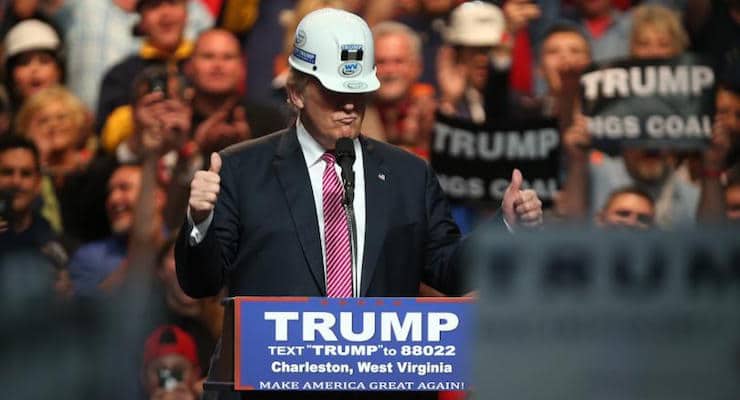

Republican presidential candidate Donald Trump models a coal miner’s helmet during his rally in Charleston, West Virginia, on May 5, 2016. (Photo: Mark Lyons/Getty Images)
President-elect Trump says he’s uniquely qualified to “drain the swamp” in Washington, D.C. He can do it, he said at one debate, because as a businessman, he understands American cronyism. “With Hillary Clinton, I said, ‘Be at my wedding,’ and she came to my wedding. You know why? She had no choice because I gave.”
He said that’s why he gives money to politicians from both parties. “When they call, I give. And when I need something from them two years later, three years later, I call them. They are there for me!”
That’s crony capitalism. Ideally, laws are applied equally; no one gets a special break because he gives money. But today’s complex government allows the politically connected to corrupt … most everything.
Even parts of the government swamp designed to protect consumers, like Dodd-Frank banking rules, get corrupted. Banks watch little changes in rules far more closely than you ever will. Then they exploit them. Bank lobbyists make money off complex laws like Dodd-Frank. They fight tooth and nail to keep them, not abolish them.
Congress recently almost got rid of one obvious example of crony capitalism, the Export-Import Bank. To encourage exports of American products, bureaucrats give loans to Boeing and other big companies.
Some principled Republicans tried to eliminate this corporate welfare, but Ex-Im loans were voted back in during the final hours of budget negotiations.
Government programs almost never die.
Businesses in cozy relationships with government don’t die either. Jeff Deist, president of the free-market Mises Institute, says when the housing bubble burst, banks should have been allowed to fail and put through “the bankruptcy and liquidation process.”
Investors would have lost big, but that’s OK, says Deist. “That’s the difference between free-market capitalism and state capitalism. With state capitalism, there are upsides for the parties involved — but no downsides.”
In the swamp, no one but taxpayers pays for their mistakes.
Politicians routinely promise to change this culture, but once they get to D.C., they lose interest, says Trump.
“They go to Washington, something happens – they become weak. … I promise this is not going to happen to me.”
I want to believe him. But even if he were an utterly principled man — and I await evidence of that — it’s tough to constantly say “no” to people.
When you’re in Congress, people ask you for money all day. “I need a grant for my charity — we do so much good!” “My business needs a subsidy/protective tariff — we employ so many people — in your state!” So it goes, week after week.
Few people bother to go to Washington to ask for spending cuts . Even though America is heading toward bankruptcy, 90 percent of congressional testimony comes from people who want more stuff.
Politicians’ cronies get more stuff. Solyndra got half a billion dollars from President Obama. The company went bankrupt, which shouldn’t be a surprise. Government has no way of knowing which ideas will succeed.
But it’s well worth it for companies to invest in lobbyists and fixers who dive into the swamp to extract subsidies.
For taxpayers? Not so much. While the benefits to lobbyists are concentrated, taxpayer costs are diffuse. Solyndra cost each of us a couple bucks. Will you go to Washington to pester your congressman about that? Probably not.
I want to believe Trump when he says he’ll “drain the swamp.” But it’s easier to believe Thomas Jefferson who, with greater eloquence, said, “It’s the natural progress of things for government to gain ground, and liberty to yield.”
Draining the swamp would mean not just taking freebies away from corporations — or needy citizens — but eliminating complex handouts like Obamacare. Candidate Trump said he would repeal Obamacare. Will he? He’s already backed off of that promise, saying he likes two parts of the law — the most expensive parts.
Every word in the register of federal regulations and laws has a special friend, a lobbyist (or 20) who will defend it, fight hard to make sure everything stays the same.
Good luck draining that swamp, President Trump. I hope you’ll succeed, if that’s really your goal.
But I won’t count on it.
The most damning journalistic sin committed by the media during the era of Russia collusion…
The first ecological study finds mask mandates were not effective at slowing the spread of…
On "What Are the Odds?" Monday, Robert Barnes and Rich Baris note how big tech…
On "What Are the Odds?" Monday, Robert Barnes and Rich Baris discuss why America First…
Personal income fell $1,516.6 billion (7.1%) in February, roughly the consensus forecast, while consumer spending…
Research finds those previously infected by or vaccinated against SARS-CoV-2 are not at risk of…
This website uses cookies.